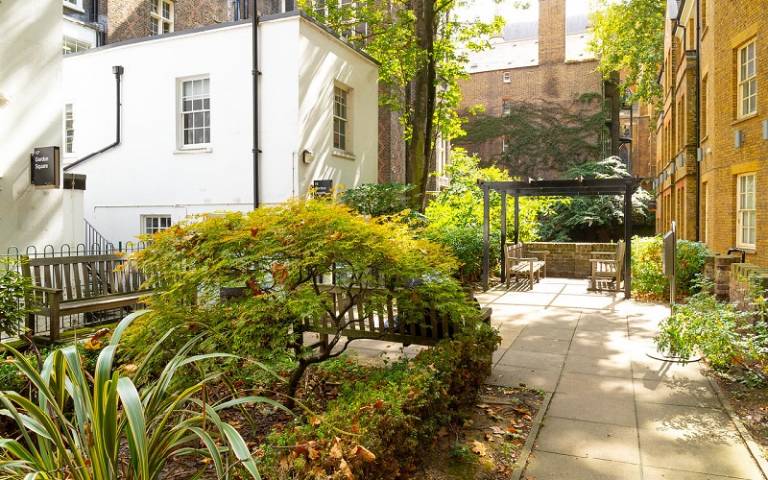Sustainable UCL during COVID: A Green Recovery
1 July 2020
What does a green and sustainable recovery look like for UCL?

The spread of COVID has had a catastrophic effect on our society and brought personal tragedy for many. It has also shone a light on significant inequalities both in the UK and globally.
In thinking to the future there has been much discussion about a green recovery, and many UCL voices are contributing to these conversations. Internally, the UCL community has been working hard on planning its own recovery by developing policies and implementing changes that will allow the institution to build back a better future for UCL. Meeting UCL’s Sustainability Strategy commitments remains important for a future resilient university. So, what does a sustainable recovery look like for UCL?
A green return to campus
While human activity has been slowing down, nature has been thriving. Since we started working remotely, we have been identifying spaces for low-cost greening interventions around Bloomsbury to make the campus more inviting for both wildlife and UCL staff and students upon our return.
During lockdown London also got some new lungs with unprecedented air quality. As we open up campus we want to keep air pollution down – both through how we travel to campus, but also how we deliver the goods that we need. UCL’s new logistics centre is consolidating nearly all the deliveries of all goods to campus which are then delivered on foot by the post team, keep an eye out for their new cargo bikes they’ll be trialling. By combining stationery or cleaning product orders across departments once we return to campus we’ll have fewer exchanges with delivery personnel; reducing not only everyone’s risk of infection but also carbon emissions.
As part of our commitment to a zero-carbon institution by 2030 we have also been reviewing measures to further reduce energy use in UCL’s buildings as they re-open – during the lockdown period we saved 2,300 tonnes of CO2, which is as much as would be absorbed by 38,000 trees for ten years. But the lockdown has also shown that there is a huge potential for further reducing energy use by being smarter in how we control our buildings and through switching-off equipment when we go home.
Finally, we have all been working out how to meet, teach and research in a time without travel. It's been wonderful to see everything from award ceremonies to international conferences thriving virtually. This period offers insights into how we can support the UCL community to make global connections with less need to travel in the future; for example ISD colleagues are developing a new virtual events platform for UCL. For more tips on how to make your return to work sustainable, check out this article.
Supporting and connecting our community of changemakers
These times highlight the importance of being able to connect with others across our UCL community. One way in which we are enabling staff and students to re-connect with UCL is by increasing support for walking and cycling to and around campus. In addition to helping people avoid over-crowded public transport and reducing everyone’s environmental footprint, cycling and walking provides many other health and wellbeing benefits. We are going to be introducing 600 new cycle parking spaces on campus and by liaising with Camden Council we’ll be making the local routes into campus more pedestrian and cycling friendly. See our cycle resources page here.
For those interested in being part of the sustainable change at UCL, the new Green Impact and LEAF programmes offer a way to make your department or lab more sustainable even while working at home. Staff group walking initiatives like PALS’ “MoonWalk” or OVPA’s “Walk the World” project are inspiring examples of how green and wellbeing initiatives can help colleagues stay connected throughout lockdown. To celebrate staff initiatives like these, we will be hosting the virtual Sustainability Awards on 15 July.
Finally, we are working with a cross-section of academic and professional staff to develop a climate change website for UCL. The website aims to showcase the breadth of activity that UCL is doing to address climate change and to connect UCL researchers with supporters and collaborators to help them make change possible. If you would like to get involved, please email c.morfeo@ucl.ac.uk.
Inspiring a new community of changemakers
In 2019 UCL made a commitment that by 2024 all students would have the opportunity to study and be involved in sustainability. This is in part a response to the great demand for sustainability in the formal and informal curriculum (a survey by the NUS identified that 81% would like to learn more about sustainability). As well as providing a sustainable welcome for new students through our sustainable UCL induction, many departments at UCL are exploring the sustainability connections for their teaching programmes. Get in touch to find out more about our sustainability induction activities.
During the 2020/21 academic year the need to support student’s wellbeing and provide community connections will be more important than ever. Through our programmes we hope to engage students in conversations about sustainability across the world; helping students to meet people with shared interests fostering community and contributing to a shared purpose both at home and when they arrive at UCL.
By using this time to take action on sustainability, we can make UCL a healthier place and increase the strength and future resilience of our community.
 Close
Close

